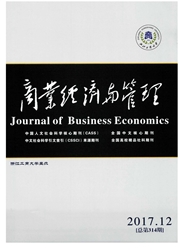

 中文摘要:
中文摘要:
自有品牌的客观质量与全国性品牌相差较小,但是感知质量相差较大,自有品牌的感知质量较低。自有品牌的学者们对此困惑不解,他们常常认为原因在于自有品牌的价格和包装档次较低等。文章从线索诊断理论的角度对此进行研究,认为自有品牌比全国性品牌感知质量低的根本原因并不是价格低和包装档次低.而在于自有品牌的品牌积累比全国性品牌低。在品牌积累上全国性品牌最高,自有品牌次之.不知名制造商品牌最低。这三种品牌的外部直观线索的诊断性也逐渐降低,自有品牌的感知质量居于不知名制造商品牌和全国性品牌的中间。与全国性品牌相比.自有品牌的品牌积累较低是自有品牌质量提高中的瓶颈问题。
 英文摘要:
英文摘要:
Store brands' objective quality is high, but perceived quality is low compared to national brands. Scholars in the store brands area are puzzled about this. They often believe that the reason is that store brands' price and levels of package are both low. This paper studies this problem by cue diagnosis framework. This paper argues that the reason that store brands perceived quality is lower than national brands is not store brand's low price or low level of package, and the fundamental reason is the lower level of store brand's accumulative brand than national brands. For the level of accumulative brand, national brands are highest, store brands lie in the middle, and the unknown manufacturing brands are lowest. The diagnosis of extrinsic intuitive cue of these three kinds of brands decreases gradually. Therefore, store brands' perceived quality lies in the middle. Compared to national brands, low level of brand accumulation is the bottle-neck problem in struggling to improve store brands' perceived quality.
 同期刊论文项目
同期刊论文项目
 同项目期刊论文
同项目期刊论文
 期刊信息
期刊信息
